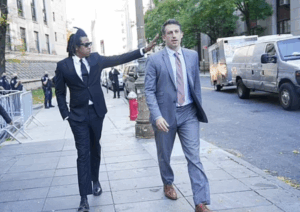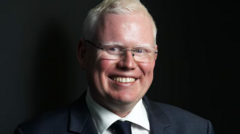After a New York court overturned Harvey Weinstein's previous conviction, Miriam Haley boldly chose to testify again, motivated by the desire to support the truth and other survivors. Her testimony, amidst intense scrutiny and emotional challenges, reaffirms the critical dialogue around sexual violence and its societal implications.
Miriam Haley's Courage: Standing for Truth in Weinstein's Retrial

Miriam Haley's Courage: Standing for Truth in Weinstein's Retrial
In a powerful testimony during Harvey Weinstein's retrial, Miriam Haley recounts her traumatic experience to uphold the truth, emphasizing progress in sexual violence awareness.
On Wednesday, a New York jury found Harvey Weinstein guilty of sexually assaulting Miriam Haley in 2006, following an earlier overturn of his previous sex crime conviction last year. Haley, who had originally testified against Weinstein in 2020, initially intended to refrain from recounting her traumatic experience again but felt compelled to act after hearing a podcast aimed at promoting Weinstein’s exoneration. "I have to stand up for myself. I have to stand up for the truth," she stated, expressing her resolve to contribute positively to the ongoing discourse about sexual violence.
During the six-week retrial, three women faced the jury, alleging that Weinstein exploited his Hollywood power to abuse them. While Weinstein was found guilty of assaulting Haley, he was acquitted of charges concerning another woman, with deliberations ongoing for a third’s accusations. In the wake of the verdict, Haley expressed her hope for increased awareness about sexual violence and the diminishing myth surrounding the "perfect victim.”
The reversal of Weinstein’s original conviction by a court of appeals last April was due to it being deemed unfair; it included testimonies irrelevant to the sanctioned allegations. In September, Weinstein faced new charges and denied the accusations, with his defense arguing that Haley and the others had consensual encounters with him in exchange for career opportunities. Haley, however, found such insinuations demeaning, intensifying her determination to face Weinstein again in court.
Ms. Haley's four-day testimony was emotionally taxing, providing a detailed account of her 2006 assault. She described her initial meeting with Weinstein in France, where he transitioned from professional discussions to inappropriate advances. On the night in question, she recounted feeling trapped as he assaulted her, ultimately declaring, "I realized, I'm getting raped, this is what this is.”
Cross-examination from Weinstein's lawyer was met with emotional turmoil, particularly when she confronted questions about the nature of their encounter. Haley emphasized, "He was the one who raped me, not the other way around," underscoring the subjective reality of her experience despite the courtroom dynamics.
Haley’s journey of coming forward mirrors the broader resurgence of advocacy surrounding sexual violence, especially following the #MeToo movement. Initially choosing silence to cope with her trauma, she now sees her testimony as part of a collective healing process, motivating other victims to share their stories despite personal risks.
Despite Weinstein's impending sentencing for separate crimes, Haley regards the retrial as a pivotal step towards change in society's understanding of sexual assault cases. The intricate interplay of personal struggle and public discourse has allowed for a new narrative that challenges long-standing stigmas, with Haley noting, "Even me showing up this time feels like a small victory... for the sake of truth, and for other women."




















